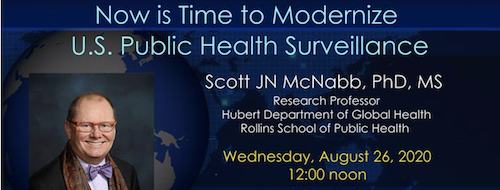Now is Time to Modernize U.S. Public Health Surveillance Seminar, 8/26
Category : News/Events
Seminar Description
Our world with no borders to pandemics requires that scientists work together forming bonds of collegiality and build bridges of mutual public health benefit, not walls of separation. The world is different now. It is misguided to think that the “hoarding” of data/information/messages/specimens is the right way to act because of paternalistic, economic, or political reasons. A better way forward is to focus global efforts to reverse the current presumption of controlled access in favor of open public health policies and practices that unambiguously support open access to public health surveillance (PHS) information. Moving to open public health (i.e., the open sharing of PHS data and confidentiality protected, indicator- based data, pathogen isolates, clinical specimens) is an important step toward modernizing PHS. We have both the responsibility and opportunity to modernize U.S. PHS after recent glaring failures. Evolved over the past 70 years as a siIoed, health outcome-specific component of public health practice, U.S. PHS is neither efficient nor effective. A new, proven, more-advanced PHS approach and model was recently presented to a Federal Policy Work Group advising Senator Lamar Alexander of Tennessee, Chairman, U.S. Senate Committee on Health, Education, Labor and Pensions called Integrated Public Health Surveillance (IDSR). Conceived and piloted in 1998 in Tanzania, IDSR has been successfully implemented in all of Africa under the authority of WHO/Afro; plus Pakistan and India. Now is time to modernize U.S. PHS!
Speaker Bio
Scott JN McNabb, PhD, MS, Rollins School of Public Health Research Professor, Hubert Department of Global Health.
Before joining the U.S. CDC Epidemic Intelligence Service (EIS) and serving the 2- year EIS residency in New Orleans, LA, Dr. McNabb worked for the Oklahoma State Health Department. Most of his professional efforts have focused on serving those in underdeveloped, underserved global settings. Before retirement from CDC, he was Associate Director for Science; Public Health Informatics and Technology Program Office; Office for Surveillance, Epidemiology, and Laboratory Services. Now Research Professor at Emory University, Rollins School of Public Health, he directs the King Abdullah Fellowship Program; and is PI of the exciting, new Africa CDC Institute for Workforce Development.
How to Watch
Check your Outlook email for the Zoom link or click here to find the link on the Global Health Seminar Series Live website!
